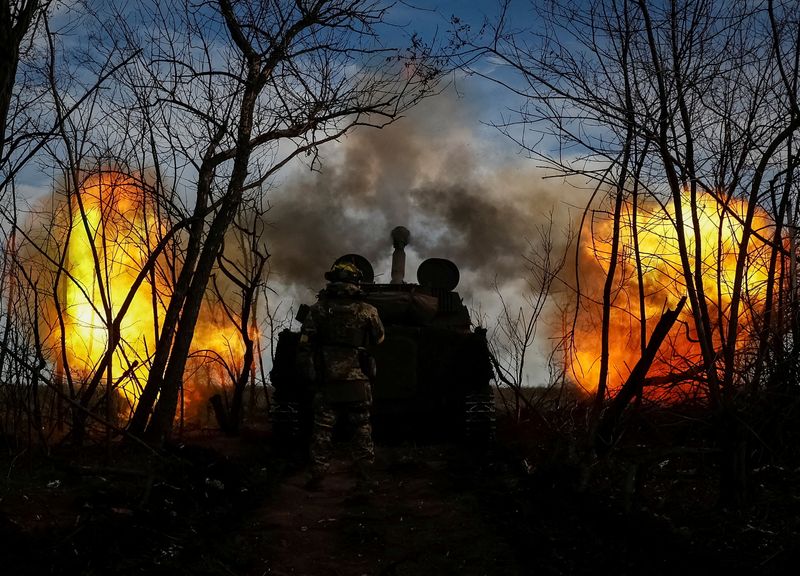By Simon Robinson
(Reuters) - Sometimes, it's what doesn't happen that matters most.
By the evening of Feb. 25 this year, a day after Russian tanks had crossed into Ukraine in the largest military attack in Europe since World War Two, Moscow's troops had reached the outskirts of Kyiv.
With distant artillery fire booming across the capital, Ukraine's defence ministry urged residents to build petrol bombs to repel the invaders. President Volodymyr Zelenskiy filmed himself with aides on the streets of the city, vowing to defend his country's independence.
"Tonight, they will launch an assault," Zelenskiy said. "All of us must understand what awaits us. We must withstand this night."
The assault never came – and 10 months on, Moscow's "special military operation" is bogged down. In some places, it's in retreat. Many in Moscow had expected Russia's military to sweep to victory, oust Zelenskiy's government and install a Russia-friendly regime.
To be sure, Russian forces remain in control of vast swathes of Ukraine's east and south, and at least 40,000 civilians have been killed and 14 million displaced in the grinding conflict. But Ukrainian forces, reinforced by billions of dollars of Western weaponry, have regularly proven themselves savvier and more effective than the morale-sapped Russians.
It was a similar story in the United States, where Republicans and some pundits had predicted a red wave in midterm elections. The Republican Party won control of the House of Representatives, but victory there was slim with a majority of fewer than 10 seats. The party not only failed to take back the Senate, but lost several gubernatorial races. Democrats triumphed in all three secretary of state contests in presidential battleground states where their Republican rivals had denied the legitimacy of the 2020 elections.
Midterms usually deliver a loud rebuke to the party of the sitting president. This time around it was a soft tsk.
In economics, most of the world's big central banks waited until March to begin ratcheting up interest rates. The European Central Bank did not move until July. Monetary hawks complained that the delay allowed inflation to surge. Will that prove costly in the long term? Can the Fed keep the U.S. economy from recession?
The answers will become clearer in 2023. There are early signs that inflation may have peaked in some economies, but growth is also softening. In a few countries – looking at you, Britain – the outlook remains grim.
At United Nations climate talks in Egypt, countries agreed to create a fund to help poor nations threatened by climate disasters, but failed to agree plans to cut emissions faster. Meantime, record heatwaves in China, floods in Pakistan and Europe, and glacier collapses in India, Italy and Chile were reminders of how fast our planet's climate is shifting.
This was also the year that protests exploded in Iran after the death of 22-year-old Mahsa Amini, who was arrested for wearing an "improper" head covering. Eyewitnesses said she was beaten, though Iranian authorities deny that. The protests, led mostly by women, spread through the country and across social classes. The longer they continue, the more of a threat they will pose to the 43-year-old Islamic revolution.
What else happened in 2022? The U.S. dollar soared, crypto imploded, and Elon Musk bought Twitter (which he preceded to shake up so much it has threatened to fall apart). It was the year Latin America lurched to the left, a ceasefire finally came in Ethiopia's civil war, and North Korea fired off missile after missile. And it was the year Britain lost a queen, gained a king and saw three Prime Ministers in Downing Street.
Finally, much of the world emerged from COVID, at least socially if not in epidemiological terms. The big exception was China, whose zero-COVID policy has sparked protests and unrest in the past few weeks. In October, the country's twice-a-decade Communist Party congress had seen President Xi Jinping tighten his grip on power and win a third term, a break with recent party tradition which had seen presidents serve just two terms. Could Zero-COVID rock the status quo?

We'll be there if it does. In 2022, Reuters delivered all of these vital stories and tens of thousands more. Over the coming few weeks we'll recap the biggest, dig into why they mattered, and ask where they may be headed. And in 2023, we'll continue to deliver the world to you, wherever you are.
Explore the Reuters round-up of news stories that dominated the year, and the outlook for 2023.
